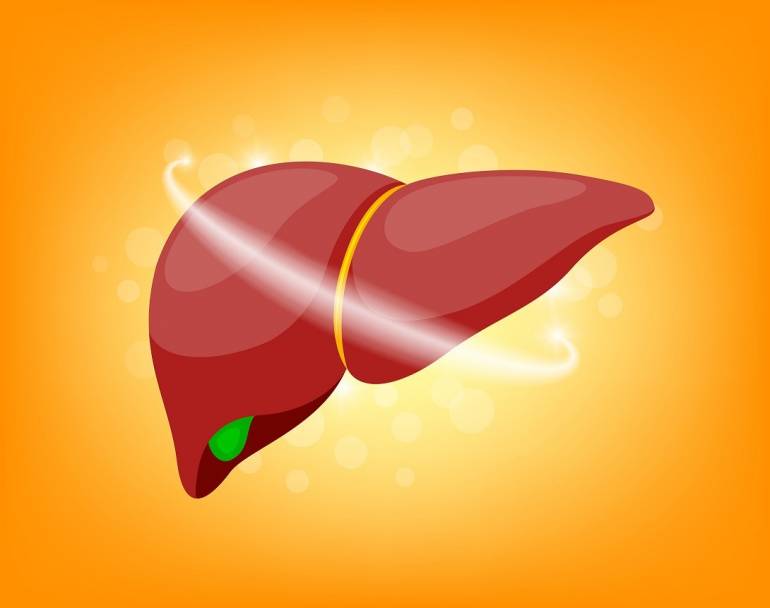The liver performs many functions in the human body. It aids digestion, detoxifies, produces bile, and is involved in carbohydrate metabolism – these are just a few of the most important processes in which it participates. This organ also has an impact on the proper functioning of the immune system. By supporting the liver, we support immunity.
The liver is the largest and multi-directional organ of the human body. It is an important part of the digestive system – it produces bile, which facilitates digestion and absorption of lipids in the digestive tract. In addition, it is involved in the metabolism of carbohydrates and lipids, stores stores stores of vitamins A, D, B12 and iron, breaks down toxins and neutralizes them by detoxifying the body. However, few people realize that the liver plays an important role in shaping the immune response to emerging infections.
How does the liver support immunity?
This organ plays an important role in the formation of an immune response to infection. It works in two stages. It contains special foraging cells, or so-called liver macrophages that remove harmful particles that reach the liver with the blood. This process (phagocytosis) releases immune factors, which strengthens protection against infections.
- Hepatic foraging cells (Browicz-Kupffer). In terms of numbers, they are the second (after hepatocytes) group of cells found in the liver. This fact alone suggests the important function they perform. Liver macrophages have the ability to phagocytose, i.e. “absorb” and neutralize harmful particles, such as viruses, bacteria, parasites, toxins, damaged proteins and other pathogens with negative effects on the body. More figuratively, Kupffer cells filter, as it were, the blood flowing through the liver, capturing and “eating” harmful particles.
- Cytokines and the immune response. During phagocytosis (“eating”) of particles of viruses, bacteria and other harmful substances, cytokines are released. This is a group of proteins that are necessary for the activation and production of a proper immune response in the body. The familiar symptoms of disease (such as fever) then appear, indicating that the body is fighting the disease.
Support the liver – you support immunity!
For the aforementioned mechanisms to work well, the liver must be efficient. Good work of this organ is an important part of building strong immunity of the body and smooth functioning of the detoxification system. Harmful substances, both those coming from outside and those produced inside the body, disrupt and weaken many metabolic processes. And this in turn weakens immunity and the ability to deal with pathogens such as viruses and bacteria.
Wanting to build a strong immune barrier, it is necessary to take into account the work of the liver. Its proper functioning is key to maintaining strong immunity against viruses and bacteria.
So how do you take care of the liver so that it can best perform its functions?
- A healthy diet – varied, rich in nutrients from different groups, containing adequate amounts of vitamin C and B vitamins. A diet for the liver is meals that are easily digestible, cooked or baked with little fat, and include plenty of vegetables and fruits. Avoid heavy and fried meals, processed foods, strong coffee and tea.
- Use of herbal spices – avoid a lot of salt, replacing it with herbs that aid digestion, such as marjoram, basil, thyme, mint, oregano, cumin. These spices stimulate the secretion of digestive juices, improve digestion, have a diastolic effect or stimulate bile secretion. However, avoid spices that can irritate the gastric mucosa, such as pepper, hot peppers, vinegar, mustard.
- Adequate body weight – fat accumulation in the body can result in cirrhosis, steatosis or inflammation of the liver. Excessive food intake and an unhealthy diet can lead to digestive problems and the accumulation of gallstones.
- Avoiding alcohol – even small amounts of alcohol are harmful to the liver. This is because its task is to break down the poisonous components of alcohol into substances that are not harmful to the body. This requires it to activate many metabolic processes. If there is a lot of alcohol or it is taken regularly, the liver may “not be able to keep up” with its neutralization, leading to the development of inflammation and other liver diseases.
- Drink herbal teas – infusions of herbal mixtures are a great addition to a liver-supporting diet. It is good that they contain ingredients that stimulate the secretion of digestive juices and bile and facilitate the removal of toxins from the body, including: dandelion, mint, perch, cumin, artichoke, yarrow, St. John’s wort.
- Use of liver preparations – to regenerate, strengthen and improve liver function, liver medicines and immune supplements containing herbal extracts of milk thistle, artichoke or dandelion are helpful. They have a protective effect on the liver, promote cell reconstruction and improve its functioning.
Strengthening immunity is worth taking care of all year round, but especially before the autumn and winter season, when viral and bacterial infections are more common. To seal the immune system, you should act in many ways, first of all, with a healthy diet and appropriate physical activity. Let’s also make sure that the liver is in good shape, so that the body is ready to efficiently deal with emerging infections.







